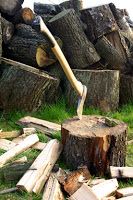Well-being recipes
Friday, February 25, 2011
We’ve thought about life hungry stupidity, ordinary magic and personal medicine. Sue’s reminded us about our coping skills. Here’s something else we can do to protect ourselves when times are tough – create a well-being recipe.
I started thinking about this a few years ago with friends Lionel Joyce, Emma Foster and Nicki Howard. We each found it amazingly helpful – and enjoyable - to write a list of all the things we know about that help us to feel well and be well.
We each put together a set of ingredients for our own well-being recipes.
Here are the ingredients for my personal well-being recipe:
 o Being loved, understood - and occasionally made fun of – by my family and friends o Being loved, understood - and occasionally made fun of – by my family and friends
o Being hugged by people who care about me
o My children and grandchildren flourishing
o Helping people realise they have more ability and creativity than they thought
 o Getting lost, then finding a way out o Getting lost, then finding a way out
o The view from the top of Trevenque in the Sierra Nevada
Diving through ocean waves as they break onto the shore
o Taking Teddy the dog for a walk, and watching him roll around in the long grass
o Washing dishes (but not drying them)
o Reading novels, especially (recently) The Book Thief and Resistance
o Watching TV detective programmes with Sue
What ingredients would you put in your recipe?
Just creating the recipe helps you feel better.
  Make sure there are some simple things on it, things you can do straight away and easily, as well as some big things. Ironing shirts is a great one for me, never fails! Make sure there are some simple things on it, things you can do straight away and easily, as well as some big things. Ironing shirts is a great one for me, never fails!
Remember to keep your recipe somewhere safe, so you can find it when you’re getting stressed or down, and need to remind yourself what’s in it.
Update your recipe every now and then – some ingredients will always be there, others will change. That makes it even more interesting.
It would be great to know about the ingredients for your well-being recipe. Do share them with us.
 
 0
Like
Published at 11:54 AM Comments (0)
0
Like
Published at 11:54 AM Comments (0)
Coping skills
Friday, February 18, 2011
I'm handing over to my wife Sue for this blog - which is all about finding your own coping skills.
Our coping skills are great, they're the ones that help us get through difficult times in our life. There's just one problem with them, we just don't always know what they are! They're a bit like breathing, something we've always done but never thought about.
For instance, I'm a list maker. If I'm harassed about things I'll often sit down and put it all on paper. I thought everyone did. So I was amazed to hear some people find exercise helps! I mean, that would never help me. Or some are social animals, joining groups or committees. Well, they say it takes all sorts.
What sort of coping skills are there? There are probably thousands out there but I look at six basics. They are: belief, affect, social, cognitive, imagination and physiological.
Belief: something about those who use their firm commitments to get them by, family values, religion, politics , anything that gives meaning to our lives.
Affect: those who move in and out of different emotional states, they laugh, they cry. They deal with life as it happens.
Social: those who use the company of others, good committee members, lots of friends, relationships
Cognitive: back to the list makers, the thinkers, the information gatherers .
Imagination: what if? Daydreaming as a positive skill.
Physiological: activity based, including eating drinking, playing music, as well as more sports etc.
Which of these rings a bell with you?
People sometimes say "I haven't got any coping skills". But as long as you're breathing you're coping!
We often belittle our strengths, ‘oh, anyone can do what I do’. But it is our personal coping skills, that somehow we all develop that keep us going, particularly when times are tough.
And don’t think, ‘oh that’s just the way I am, I’ve always liked swimming’ (or daydreaming or dancing). As you’re doing what you do, remind yourself that whatever others say, you are using your coping skills to help you get you through. And they will!
Now excuse me, I have to make a list.
 0
Like
Published at 2:21 PM Comments (0)
0
Like
Published at 2:21 PM Comments (0)
Ordinary magic and personal medicine
Saturday, February 12, 2011
When times are tough we start with survival, as I explained in my last blog. But we can do more, a lot more. Human beings have an amazing capacity to overcome adversity. We are resilient. We can bounce back from difficulties and tough times.
Ordinary magic and personal medicine are key.
By ordinary magic, I mean the everyday relationships that most of us just take for granted. Caring parents, friendships we developed as children and teenagers, and close relationships as adults - at home, at work or in our social lives. These are enormously helpful when times are tough. They act as buffers, they protect us.
Here are the experiences of some people who took part in a recent study. [If you want to read more. check out http://hea.sagepub.com/content/12/4/439.long ]
What was most helpful in dealing with depression, stress or worries, we asked them?
George said ‘I think talking to my wife would've been the most beneficial’. For Alice, it was ‘being able to talk about it with a group of close friends’.
Mark’s boss helped him through a bout of severe depression. 'I just gradually went down hill, I lost a tremendous amount of weight, my work performance was down, and my boss noticed and he knew my wife had left me and he asked me if I'd thought about suicide and made me promise that I wouldn’t do anything in the next few days and arranged for me to see his psychiatrist - his father had shot himself in the head, and he recognised what I was going through and he knew that I had separated from my wife. I was very lucky to have him there at the time.'
Personal medicine refers to things we do, deliberately, to increase our inner resources.
We may need to start by facing the reality of our situation. Sally says: ‘Accepting it and dealing with it’. Sometimes we also have to realise our own part in it all. Stephen ‘was doing a lot of drugs and drinking, and just wanted to straighten myself up.’
Then, we can do a whole variety of different things to expand our positive emotions.
‘I've played sport for all my life so that's always helped’ said Sophie. And then ‘meditation or breathing. Also writing a journal’.
'I used to lay on the couch and listen to Mozart’, said John. ‘ I’m a big fan of classical music. It really calms me down’.
 Andrew’s personal medicine was more direct: ‘I just go out and chop away at a heap of wood. Seriously!’ Andrew’s personal medicine was more direct: ‘I just go out and chop away at a heap of wood. Seriously!’
We can work on extending our bonds and networks. ‘I've just got a new grandson and that gives me a positive outlook for the future’ said Brad. ‘I'm looking forward to showing him around the farm….. I think I'm travelling pretty well at the moment.' Or like Val (and me!): ‘I’ve got a new puppy dog’.
What works for you? What ordinary magic do you call on when times are tough? What is your personal medicine?
You could make a list. You might just be surprised how many things are on it, when you start to think about them. Then share it with us, on Comments
Sometimes we do get stuck. Either we can’t work out what our ordinary magic or personal medicine is – or else we feel we just don’t have enough of them to tackle the problem’s were facing. In my next blog I’ll explain how to find (and build on) your personal strengths. And where else to go for help, if you need it.
 0
Like
Published at 9:00 AM Comments (0)
0
Like
Published at 9:00 AM Comments (0)
When times are tough
Friday, February 4, 2011
In Jan Martel's Life of Pi, a 16 year old boy called Pi finds himself adrift on a lifeboat in the middle of the Indian Ocean, At first he thinks he is all alone, but he soon finds out he's wrong, very wrong. He is sharing the lifeboat with a Royal Bengal tiger. 
Pi is terrified. He starts to cry. He's convinced he's going to die. He finds it unbearable to think about all the life in front of him, that he will now never see.
But at that moment Pi discovers he has a fierce will to live. 'It is not a question of courage' he says, 'it's something constitutional, an inability to let go. It may be nothing more than life-hungry stupidity.'
I love the idea of life hungry stupidity.
It is our basic, essential desire to survive.
Spinoza was a philosopher and lens-grinder, who lived in Amsterdam more 300 years ago. He was a strange guy, but he had some great ideas. One of his best ideas was that our desire to survive is at the very essence - the heart - of our being. His word for this was conatus.
It works in real life too.
Joe Simpson was climbing in the Andes when disaster struck. First he slipped down an ice cliff and landed awkwardly, breaking his led. Then he fell 100 foot over a cliff and was dangling in mid-air. His climbing partner thought he was dead and cut the rope, dropping Joe way down onto a precarious ice bridge inside a vast crevasse.
In Touching the Void, Joe Simpson describes his response: ‘It would be a long time before cold and exhaustion overtook me on the ice bridge, and the idea of waiting alone and maddened for so long had forced me to this choice: abseil until I could find a way out, or die in the process. I would meet it rather than wait for it to come to me.’
Joe chose action over inaction, even when the chances of success were vanishingly small. Remarkably, he survived: eventually finding a small hole in the roof of the crevasse, crawling slowly out of danger and somehow finding his way back to base camp.
When times are tough, we can turn to our ‘life hungry stupidity’, our desire for survival, our inner hope.
And we can build on it. In my next blog, I will explain how ordinary magic and personal medicine can help us do more than just survive.
 0
Like
Published at 2:57 PM Comments (0)
0
Like
Published at 2:57 PM Comments (0)
Spam post or Abuse? Please let us know
|
|